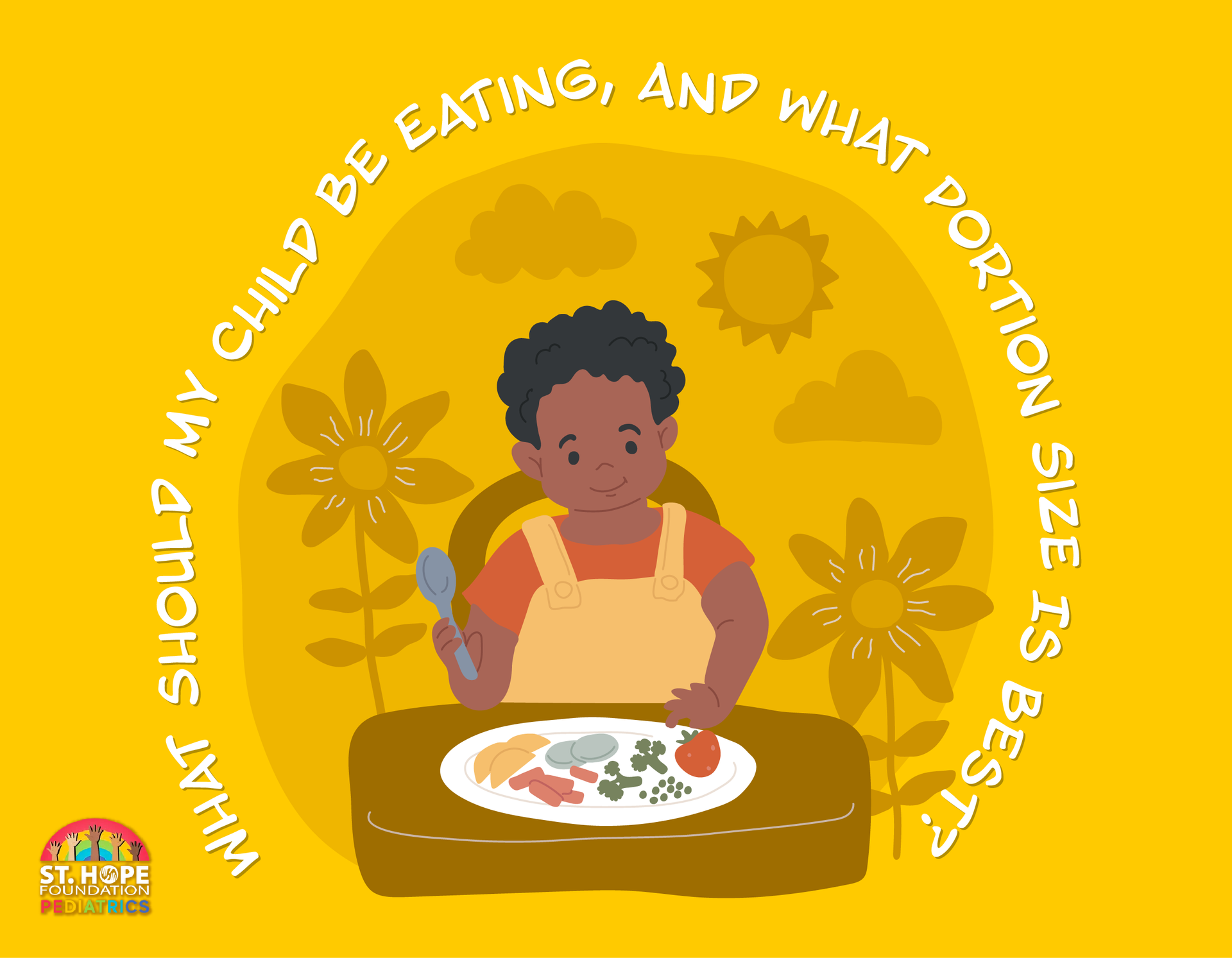
Trying to figure out the best diet for your kid, what portion size is best, and then, the hardest challenge of all, getting them to actually eat it can be a strenuous, never-ending struggle for parents. The pediatricians at St. Hope Healthcare have experience helping families in Houston ensure their child receives essential nutrients and can provide guidance and tools you can use to keep your child eating healthy.
Essential Food Groups for Children
Fruits and vegetables should make up a majority of children’s diets, as they can provide essential vitamins that boost their immune system, improve their vision and even reduce their risk of developing certain diseases later in life. It may be easier to get children to eat slightly sweet fruits or vegetables, and some may have texture preferences like soft or crunchy. Examples include sliced apples or applesauce, grapes, bananas or oranges, as well as vegetables like carrots, bell peppers and peas.
Dairy like milk, yogurt and cheese is a key source of calcium and vitamin D that can be critical for healthy bone and teeth development. Grains like whole wheat bread and oatmeal give children essential energy for the day as well as fiber and iron to aid digestion.
Protein such as lean meats, beans and fish can be crucial for building tissues and muscles and keeping hair healthy. Fish and other foods rich in fats and oils like avocados and olive oil can also facilitate healthy brain function, providing iron and omega-3 fatty acids that can promote better learning and strengthen brain development.
Water is another critical part of your child’s diet. Kids can quickly get dehydrated due to high energy levels that can deplete hydration levels, but drinking soda and juice instead of water can worsen their dehydration and surge their sugar intake. Ensuring your child always has water accessible and is reminded to drink frequently can help them maintain proper cognitive function and contribute to their overall health.
Daily Nutritional Needs and Goals by Age Group
Toddlers (one to three years): Explore new foods and develop healthy eating habits
- Vegetables: 1 cup
- Fruits: 1 cup
- Grains: 3 ounces
- Protein: 2 ounces
- Dairy: 2 cups
Preschoolers (four to five years): More energy and nutrients to support increased energy and activity
- Vegetables: 1.5 cups
- Fruits: 1.5 cups
- Grains: 4 to 5 ounces
- Protein: 3 to 4 ounces
- Dairy: 2.5 cups
School-Age Children (six to 12 years): A balanced diet to support their physical and cognitive development
- Vegetables: 1.5 to 2.5 cups
- Fruits: 1.5 to 2 cups
- Grains: 5 to 6 ounces
- Protein: 4 to 5 ounces
- Dairy: 2.5 to 3 cups
Teenagers (13 to 18 years): Increased portions with higher nutrition requirements to accommodate rapid growth and hormonal changes
- Vegetables: 2.5 to 3 cups
- Fruits: 2 cups
- Grains: 6 to 8 ounces
- Protein: 5 to 6.5 ounces
- Dairy: 3 cups
Tips to Teach Healthy Eating Habits
Try to avoid giving your child the same foods. Variety not only gives children a wider range of nutrients, but it can also keep mealtime more interesting. That said, it’s important to stay consistent with scheduling mealtimes to regulate their hunger and digestion. Inconsistency can lead to unhealthy snacking and a high sugar intake, which can lead to everything from dental issues to a long-term elevated risk of obesity.
While there are healthy snacks that can maintain energy levels, like yogurt, fruit slices, veggie sticks with hummus or whole-grain crackers with cheese, serving meals at regular intervals can create a routine that children can depend on, reducing the need to graze throughout the day. If your child is more active and craves more snacks, increasing their portions at mealtimes can help meet their energy needs.
Involving children in cooking and meal planning can also increase their interest in food and make them feel more in control of what they eat, increasing their willingness to try new foods.
Finally, don’t stress over “clean plates”. Healthy eating is a war, not a battle. Even if your child doesn’t finish everything on their plate, they can still get essential nutrients. Instead of insisting on a clean plate, which can create pressure that can lead to overeating or increased resistance to eating, look for fullness cues and let them leave some food on the plate when needed.
Work With Pediatricians Who Have Helped Hundreds of Families in Houston Keep Their Children Happy and Healthy
The team at St. Hope Pediatrics will be with you through every step of your child’s development, giving you guidance and solutions when needed to ensure your child eats well and develops normally. Call (713) 778-1300 and book a wellness appointment with one of our dedicated pediatricians today.













